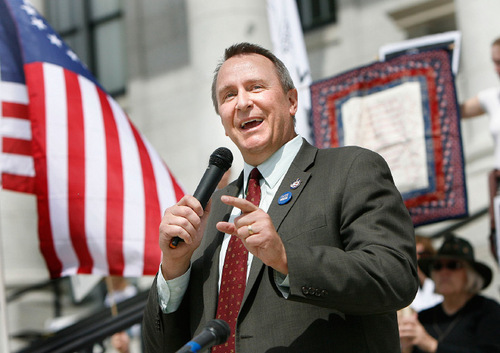This is an archived article that was published on sltrib.com in 2010, and information in the article may be outdated. It is provided only for personal research purposes and may not be reprinted.
Washington • Utah Attorney General Mark Shurtleff has a hard time envisioning a scenario where the government doesn't sue the leaders of college football's championship system for being an "illegal monopoly." The question is whether the states have to go it alone or whether the U.S. Attorney General will join in the legal fight.
Shurtleff made his pitch to Justice Department officials during a meeting early Wednesday in Washington, D.C., and left optimistic.
"I was blown away," he said. "What I was very pleased to see is they are doing their due diligence on this thing. I didn't get that feeling initially."
No formal investigation or lawsuit is expected for some time, if Justice decided to participate at all. But the meeting marked a major milestone in Shurlteff's effort to put a case together against the Bowl Championship Series, which determines what teams play in the national championship using a combination of human polls and computer rankings.
The BCS favors teams from six "automatic qualifying" conferences while five unaffiliated conferences have little chance to play in their sport's most publicized games.
Shurtleff is convinced the BCS is violating anti-trust laws by making it "impossible" for teams from conferences such as the Mountain West Conference and Western Athletic Conference to play for the national title and split the proceeds equally.
BCS executive director Bill Hancock thinks Shurtleff's investigation is a waste of time and money.
"It's hard to imagine a bigger waste of taxpayer money than to involve the government in college football, especially when experts believe a lawsuit is certain to be lost," he said. "A recent anti-trust case in men's tennis cost more than $10 million. Is that how the people of Utah want their tax dollars spent?"
Shurtleff said Utah couldn't cover the costs of the litigation on its own, which is why he has repeatedly reached out to attorneys general from other states and sent a detailed legal brief to the Justice Department six months ago.
He believes the Justice Department would be in a better position to push the issues because AGs from around the nation often represent the major universities in their states and it is the college presidents who make up the BCS.
"Potentially the defendants are your own clients," Shurtleff said.
He made his pitch just days before the University of Utah and Texas Christian University play in a Saturday afternoon game with national implications. The two teams are members of the Mountain West, which is not part of the BCS, but the teams are ranked third and fifth nationally. The top two at the end of the year play for the national championship.
Shurtleff insists that no matter what happens on the field, no team from outside a BCS conference has a real chance to play in the ultimate college football game. So far, no non-BCS team has played for the championship.
"There is no scenario whatsoever where it can happen under the current regime," he said. "It can not happen."
Next year, Utah moves to the Pac-12, a BCS-affiliated conference.



